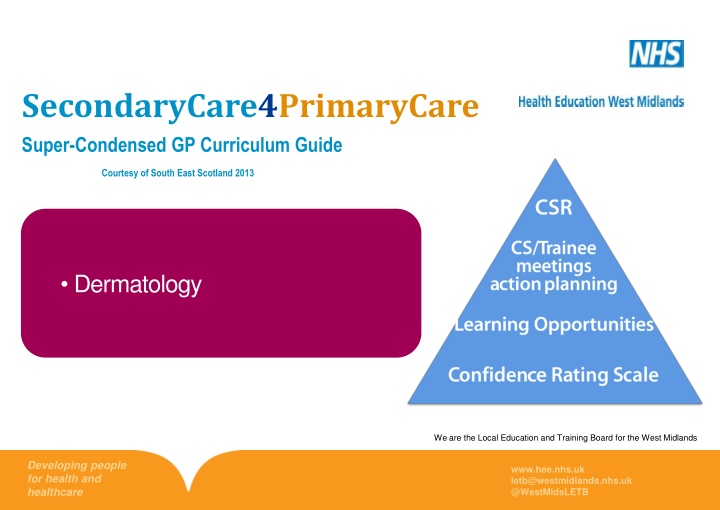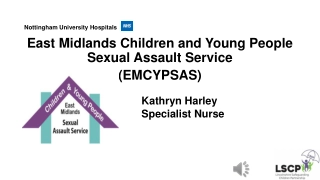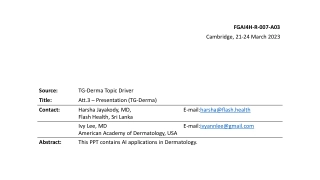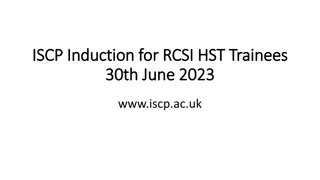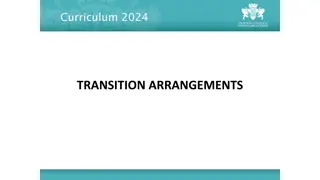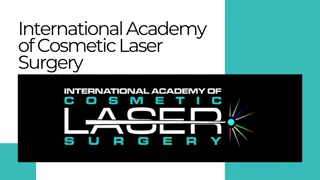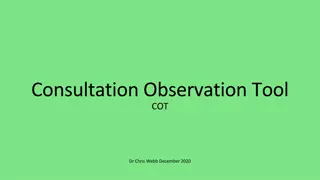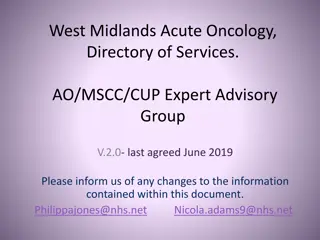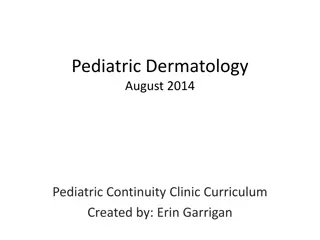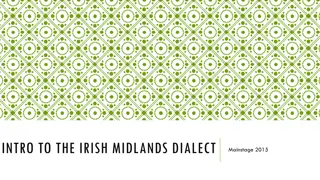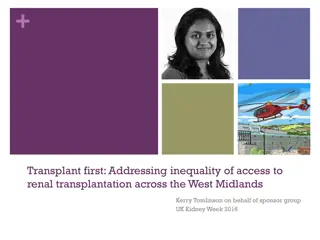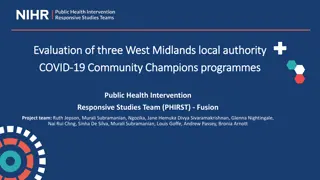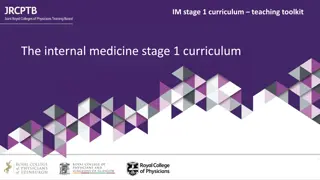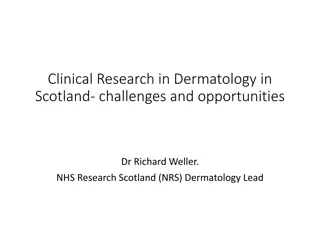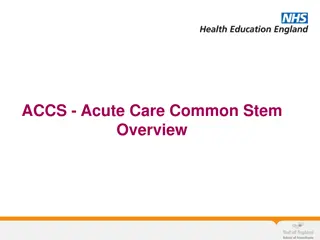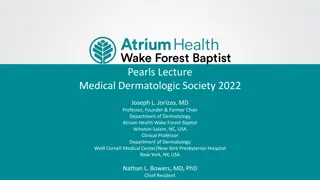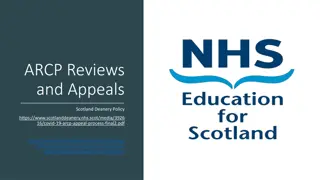Dermatology Curriculum Guide for GP Trainees in West Midlands
This condensed curriculum guide for dermatology provides a structured approach for Clinical Supervisors and GP Specialty Trainees in the West Midlands region. It outlines key learning areas, offers suggestions for additional learning opportunities, and includes a confidence rating document for trainees. The guide aims to enhance consistency in educational experiences and outcomes, promoting focused discussions on learning needs and objectives. Supervisors are encouraged to oversee trainee progress, hold formative meetings, and sign off workplace-based assessments.
Download Presentation

Please find below an Image/Link to download the presentation.
The content on the website is provided AS IS for your information and personal use only. It may not be sold, licensed, or shared on other websites without obtaining consent from the author.If you encounter any issues during the download, it is possible that the publisher has removed the file from their server.
You are allowed to download the files provided on this website for personal or commercial use, subject to the condition that they are used lawfully. All files are the property of their respective owners.
The content on the website is provided AS IS for your information and personal use only. It may not be sold, licensed, or shared on other websites without obtaining consent from the author.
E N D
Presentation Transcript
SecondaryCare4PrimaryCare Super-Condensed GP Curriculum Guide Courtesy of South East Scotland 2013 Dermatology We are the Local Education and Training Board for the West Midlands Developing people for health and healthcare www.hee.nhs.uk letb@westmidlands.nhs.uk @WestMidsLETB
Dermatology The Super Condensed Curriculum Guide has been created as a package to be used by both Clinical Supervisor and GP Specialty T rainees in order to support hospital units and their attached Clinical Supervisors deliver an educational experience of the highest quality feasible that is relevant to the GP trainee, thus improving consistency of approach and outcome throughout the region. The Guide highlights areas of curriculum relevant to the specialty and groups these into geographical areas where learning needs might be achieved e.g. acute, chronic, community, as well as including core skillsand technical skills to be achieved. It also makes suggestions for additional learning opportunities within the post e.g. teaching and audit. Some posts offer opportunities for learning that relates to other areas of the curriculum, and these are highlighted. The idea is that this would inform the supervisor and stimulate discussion regarding possible learning needs and how these might be addressed -for example, that the trainee may need to attend outpatient clinics or community day hospitals to fulfill learning needs which cannot be met on the wards. The confidence rating document is designed for use by the trainee in preparing for the post and for the first meeting with the CS. Although not exhaustive, it provides a list of clinical conditions and issues pertinent to the specialty, requiring the trainee to rate their confidence in these areasat the start (and possibly middle and end) of the post. Areas for further development can be identified, and discussion promoted around these at the first CS meeting thereby providing a platform for negotiating how these needs could be met in the post. It also provides space to document points for action which can be recorded aspart of aPDPinthe eportfolio. The supervisor meeting flowchart clearly lays out the tasks for each meeting and the preparation needed before and after each. This is to aid CS and trainee to create both a structure and a timeline for discussionand the workplace based assessments. The hope is that this would enable a more focussed and confident approach to identifying and meeting objectives in trainee education and assessment. We are the Local Education and Training Board for the West Midlands Developing people for health and healthcare www.hee.nhs.uk letb@westmidlands.nhs.uk @WestMidsLETB
Dermatology This report should be completed as part of the last appraisal meeting with your trainee prior to their 6 monthly review with their GP Educational Supervisor, or at the end of each 6 month placement (see timeline on flow chart). The e-Portfolio has a section for the Clinical Supervisor to write a short structured report on the trainee at the end of each hospital post. Oversee day to day work of the trainee (direct contact or delegated) Hold 3 formative meetings with the trainee using the Super Condensed Curriculum Guide (gather and collate information from other sources) Sign off Workplace based assessments (WPBA) This covers: The knowledge base relevant to the post; 3 x Case Based discussions (CBD) Practical skills relevant to the post 3 x Mini-Clinical Evaluation Exercise (Mini-CEX) The professional competencies, grouped into 4 - Relationships, Diagnostics, Clinical Management, Professionalism Direct Observation of Procedural Skills (DOPS) Multi-source feedback (MSF) 5 clinicians only This is based on the level that you would expect an ST trainee to have i.e. ST1 or ST2. NBassessmentscan be undertaken by other appropriate membersof staff: Associate specialists, staff grades, enhanced nurse practitioners, specialty trainees>ST4 Ensure trainees are aware of their responsibilities for patient safety The electronic form provides reminders of the definitions of the competences to make writing the report easier (word pictures). It may also be helpful to refer to the relevant curriculum statement(s) on the RCGP website in reporting on the knowledge and skills relevant to the post. Be the trainee s initial point of contact for specific issues relating to their post Support the trainee in attending GPST focussed educational opportunities: HBGL monthly meeting; GPST Core Curriculum Course. Communicate and record appropriately any concerns about a trainee s progress and development to their GP Educational Supervisor and TPD Complete a Clinical Supervisors report (CSR) at the end of placement We are the Local Education and Training Board for the West Midlands Developing people for health and healthcare www.hee.nhs.uk letb@westmidlands.nhs.uk @WestMidsLETB
Dermatology The report should identify and comment on: Any significant developmental needs identified during a placement, and also point out any areas where the trainee has shown particular strengths. The simplest way isto go to: The progress of the trainee in terms of the evidence of competence (it is not a pass/ fail report). https://eportfolio.rcgp.org.uk/login.asp click on the Assessment form page complete the details page and click on CSR at the bottom. complete the form with the trainee present and submit. If there are serious issues of professional performance or ill health during a placement these will need to be handled by normal acute trust/ PCT/ Deanery mechanisms. Or you can log in with your RCGPlogin detailsto: https://eportfolio.rcgp.org.uk/login.asp Select your trainee Left hand navigation bar > click evidence Scroll down to find the relevant post Click under CSR (hand with pen) Complete documentation with trainee present and submit We are the Local Education and Training Board for the West Midlands Developing people for health and healthcare www.hee.nhs.uk letb@westmidlands.nhs.uk @WestMidsLETB
Dermatology T rainee & Clinical Supervisor meet within 2 weeks of starting post Discuss ideas, concerns & expectations for the post and how to focus learning in areas of identified needs. Discuss plans for GPST HBGL attendance in this post. Complete a brief learning plan together, trainee documents in the e-portfolio learning log and createsapdpfor eachcategory. Clinical Supervisor documents brief summary of meeting in the educator notes. Both set dates and times for completion of relevant WPBA assessments Set date and time for mid post review Review progress with action plan, confidence rating scale, MSF (if required) and consider pointers for needs Discuss general progress using the RDMp model as a guide (see CSR) Clinical supervisor documents in educator notes and trainee documents in e-portfolio learning log and updates pdp and learning plan If any concerns contact the trainee s GP Educational Supervisor/GP unit or TPD T rainee looks at super-condensed guide & confidence rating scale for specialty & identify any issues that need to be discussed Review the previous CSR The final meeting should have occurred by January or mid June prior to the ARCP panel meeting Review progress with mandatory elements of WPBA and any further evidence including audit & SEA Complete CSR documentation If any concerns contact the trainee s GP Educational Supervisory/GP unit or TDP T rainee completes the Deanery post assessment questionnaire (P AQ) Assessments Assessments January or Mid June August or February August or February End October or April CSR We are the Local Education and Training Board for the West Midlands Developing people for health and healthcare www.hee.nhs.uk letb@westmidlands.nhs.uk @WestMidsLETB
Dermatology The Trainee has agreed to the following responsibilities at the commencement of their training: to always have at the forefront of my clinical and professional practice the principles of Good Medical Practice for the benefit of safe patient care. T rainees should be aware that Good Medical Practice (2006) requires doctors to keep their knowledge and skill up to date throughout their working life, and to regularly take part in educational activities that maintain and further develop their competence and performance to ensure that I develop and keep up to date my learning portfolio which underpins the training process and documents my progress through the programme to use training resources available optimally to develop my competences to the standards set by the specialty curriculum to support the development and evaluation of this training programme by participating actively in the national annual GMC/COPMeD trainee survey and any other activities that contribute to the quality improvement of training to ensure that the care I give to patients is responsive to their needs, that it is equitable, respects human rights, challenges discrimination, promotes equality, and maintains the dignity of patients and carers to acknowledge that as an employee within a healthcare organisation I accept the responsibility to abide by and work effectively as an employee for that organisation; this includes participating in workplace based appraisal as well as educational appraisal and acknowledging and agreeing to the need to share information about my performance as adoctor in training with other employers involved in my training and with the Postgraduate Dean on a regular basis In each placement the Trainee agrees to: Complete the confidence rating scale prior to each meeting with their clinical supervisor. Discuss with their clinical supervisor their learning needs based on their confidence ratings and create an action plan Create a pdp, using SMART objectives, based on the action planning undertaken at any meeting with their clinical supervisor to maintain regular contact with my T raining Programme Director (TPD) and the Deanery by responding promptly to communications from them, usually through email correspondence Actively engage with my clinical supervisor in addressing any feedback or raising any issues which may impact on their performance to participate proactively in the appraisal, assessment and programme planning process, including providing documentation which will be required to the prescribed timescales Actively engage with completing their required assessments in a timeous manner Complete their e-portfolio as required by the Deanery and RCGP Complete the annual GMC trainee survey. Developing people for health and healthcare www.hee.nhs.uk letb@westmidlands.nhs.uk @WestMidsLETB
Dermatology We are the Local Education and Training Board for the West Midlands Developing people for health and healthcare www.hee.nhs.uk letb@westmidlands.nhs.uk @WestMidsLETB
Dermatology Below are some of the issues pertinent to General Medicine. T o help you to organise your thoughts they have been grouped into competency areas. The list has been drawn together from highlights from the GP Curriculum and RCGP Learning Outcomes for Care of acutely ill patients in the medical setting and is by no means exhaustive. T o ensure a rich experience it is important to think broadly around topics/experiences. This document is intended to help identify areas for further development and creation of specific learning needs for the post. Please record your level of confidence for each bullet point by ticking in the Red (no confidence), Amber (some confidence) or Green (confident) columns. This should be completed in preparation for your first meeting with your Clinical Supervisor and will help you create a baseline from which you can monitor your progress during the placement. Developing people for health and healthcare www.hee.nhs.uk letb@westmidlands.nhs.uk @WestMidsLETB
Dermatology We are the Local Education and Training Board for the West Midlands Developing people for health and healthcare www.hee.nhs.uk letb@westmidlands.nhs.uk @WestMidsLETB
Dermatology We are the Local Education and Training Board for the West Midlands Developing people for health and healthcare www.hee.nhs.uk letb@westmidlands.nhs.uk @WestMidsLETB
Dermatology Audit We are the Local Education and Training Board for the West Midlands Developing people for health and healthcare www.hee.nhs.uk letb@westmidlands.nhs.uk @WestMidsLETB
Dermatology We are the Local Education and Training Board for the West Midlands Developing people for health and healthcare www.hee.nhs.uk letb@westmidlands.nhs.uk @WestMidsLETB
Dermatology www.hee.nhs.uk letb@westmidlands.nhs.uk @WestMidsLETB We are the Local Education and Training Board for the West Midlands Developing people for health and healthcare www.hee.nhs.uk letb@westmidlands.nhs.uk @WestMidsLETB
